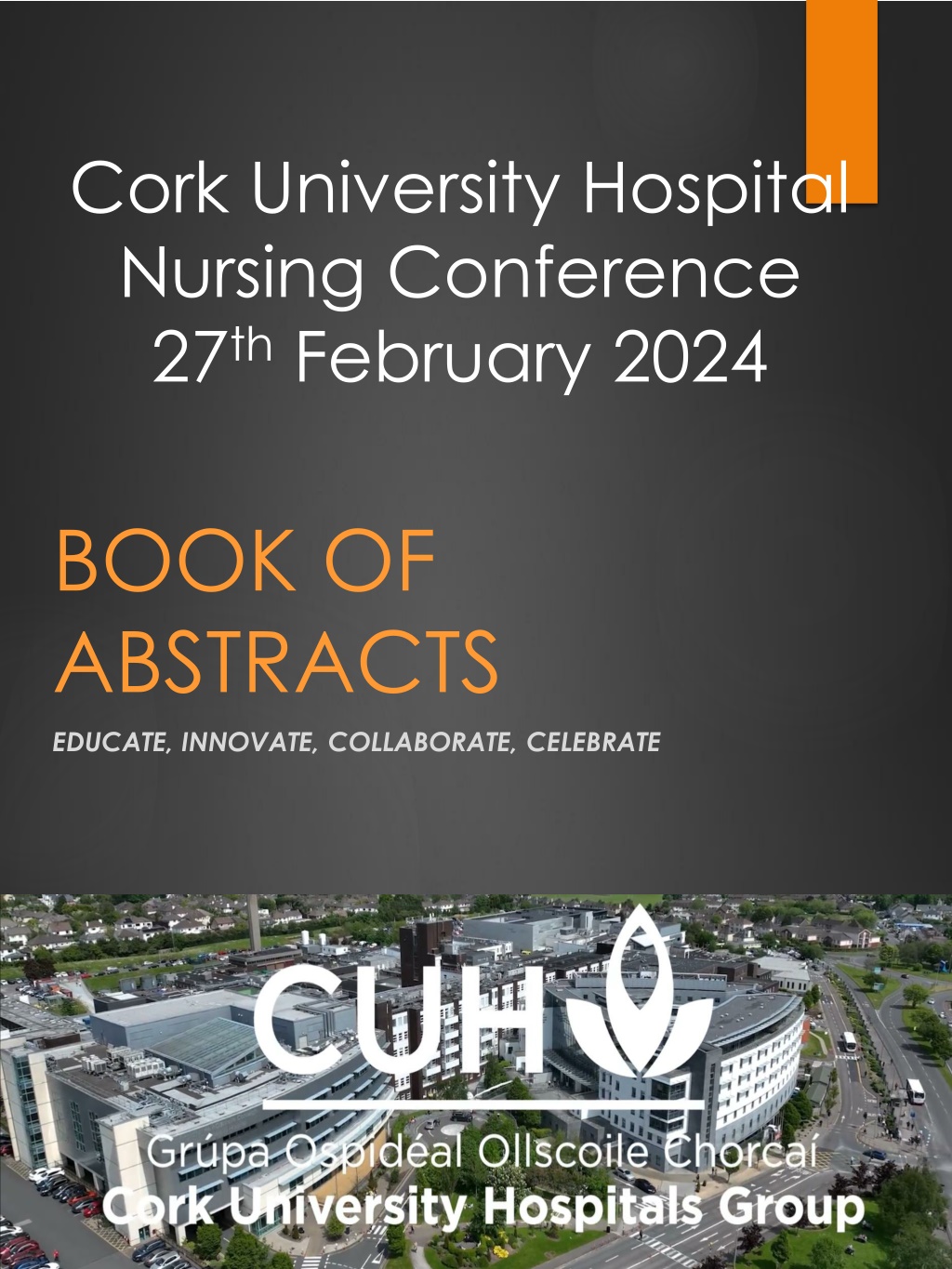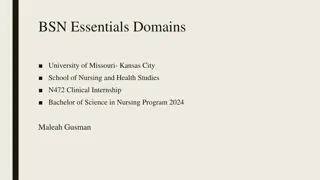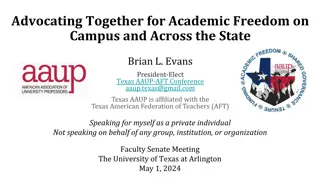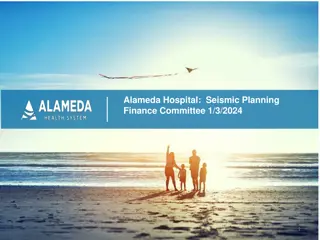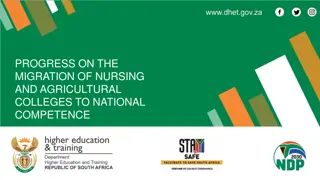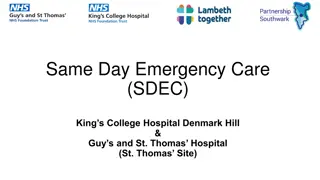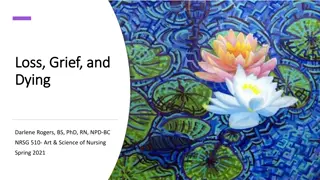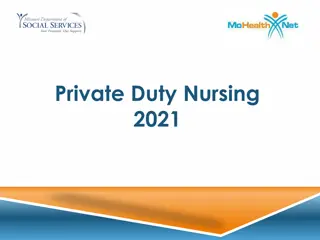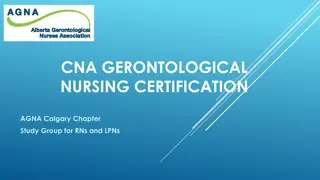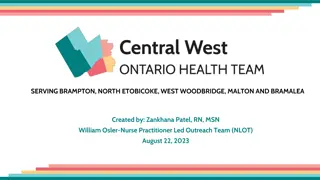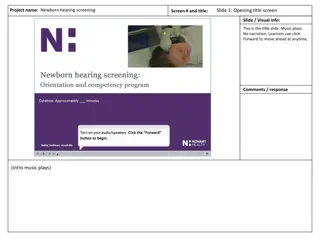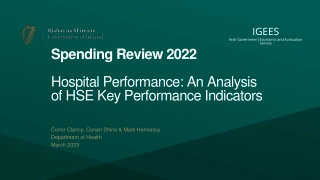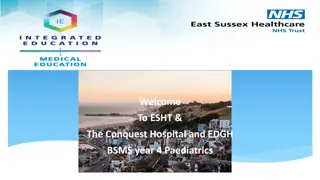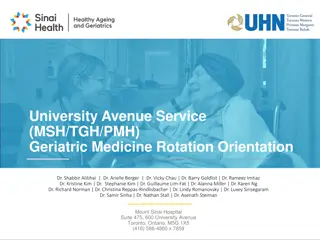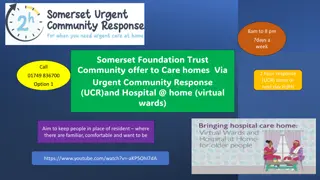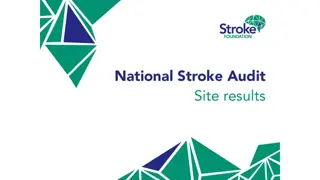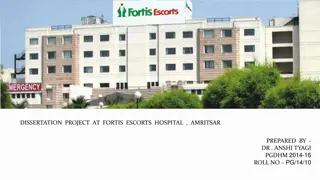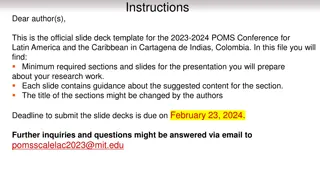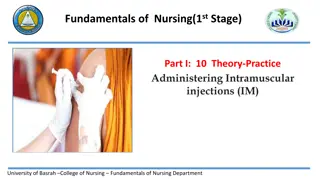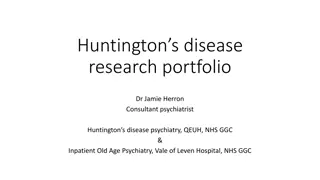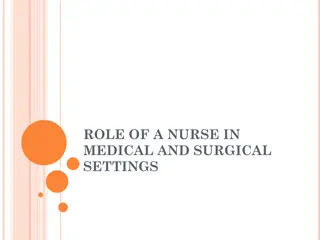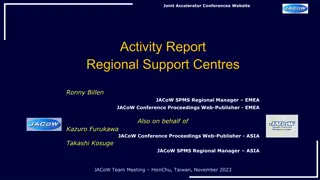Cork University Hospital Nursing Conference 2024: Educate, Innovate, Collaborate, Celebrate
Welcome to the Cork University Hospital Nursing Conference on February 27th, 2024. This event focuses on education, innovation, collaboration, and celebration in nursing. Engage with keynote speakers like Ms. Marie Kilduff and Ms. Carolyn Donohoe. Explore a diverse range of abstract submissions showcasing nurse-led initiatives in healthcare. Join us for an inspiring day of learning and networking.
Download Presentation
Please find below an Image/Link to download the presentation.
The content on the website is provided AS IS for your information and personal use only. It may not be sold, licensed, or shared on other websites without obtaining consent from the author. Download presentation by click this link. If you encounter any issues during the download, it is possible that the publisher has removed the file from their server.
Presentation Transcript
Cork University Hospital Nursing Conference 27thFebruary 2024 BOOK OF ABSTRACTS EDUCATE, INNOVATE, COLLABORATE, CELEBRATE
WELCOME MESSAGE Dear Colleagues, It is our great pleasure to welcome you to Cork University Hospital to join us at our 2024 Nursing Conference entitled Educate, Innovate, Collaborate, Celebrate. We have an exciting line up of keynote speakers, presenters and poster presenters and we would like to thank them all for their valued contribution to the success of this conference. We received a wide range of abstract submissions for our conference, demonstrating the outstanding contribution that nurses have made in shaping and influencing healthcare through on-going innovation, quality improvement initiatives and research at practice level. We would like to thank you all for celebrating nursing at our conference and wish you a very enjoyable day. Best wishes, The CUH Conference Committee
KEYNOTE SPEAKERES
Ms Marie Kilduff Director of National Clinical Leadership Centre (NCLC) for Nursing and Midwifery, ONMSD, HSE During the course of her career, Marie has acquired a depth of knowledge in clinical practice, leadership, education and management. Through her roles, committee membership and engagement in post registration education, Marie has consistently advanced her leadership knowledge and skills while also developing strong connections with leadership professionals globally. Marie is a qualified integrative psychotherapist, ICF accredited coach and a Florence Nightingale Senior Scholar. In her current role, Marie uses her experience, expertise and strategic vision to guide the NCLC team in the design and delivery of leadership programmes and initiatives, in line with national and international best practice.
Ms Carolyn Donohoe Director of Education, Policy and Standards, NMBI Carolyn Donohoe is a registered nurse with more than 20 years experience in multiple nursing roles including as Clinical Facilitator and Clinical Nurse Manager 3 (CNM3) in Critical Care, Nursing Practice Development Coordinator and Directorate Nurse Manager for Perioperative Services in St Vincent s University Hospital, Dublin. A keen advocate of education and continuous professional development, her post-graduate qualifications include a Higher Diploma in Critical Care Nursing, a Master s in Nursing Education, and a Professional Diploma in Strategy, Innovation and Change. More recently, her studies have focused on leadership in regulation at an international level. Since joining NMBI, she has led change in the organisation s approach to regulatory site inspections, focussing on the balance between academic and clinical components of programmes. She has updated a number of important resources that set standards and requirements for nursing and midwifery education and practice. Carolyn leads a team of Professional Officers and Education Department Officers who strive to ensure that our standards and guidance materials are relevant for todays practice environment and that the outputs provide a clear road map for safe effective practice, for the benefit of both the public and the professions.
Mr Dermot Burke National Innovation Fellow with the HSE Spark Innovation Programme & Product Manager at Cushla Health Dermot is a physiotherapist and last year was appointed the first HSCP National Fellow for Innovation and Change on the HSE Spark Innovation Programme He has worked in the public and private healthcare systems in Ireland and the UK since graduating in 2010. In 2020, he was awarded as an outstanding graduate on TCD's Post Grad Diploma in Healthcare Innovation and has since been involved in innovation projects promoting a holistic approach to health and wellbeing through multi-sector collaboration and digital technology. Last year he ran the HSE Spark Programme s AI + ML in Healthcare Forum which brought together thought leaders and experts in the field along with frontline healthcare workers to explore the possibilities this new technology offers. He also works as a Product Manager with a health-tech start-up, Cushla Health, who are working to improve outcomes by facilitating access to patient healthcare data.
Ms Vera Keohane Professional Organiser Vera is a professional organiser and founder of Enjoy Your Home . She worked in the medical profession for almost 30 years as a nurse and midwife prior to certifying as Ireland s first KonMari consultant. She initially trained with Marie Kondo in New York in 2018, since then Vera has developed her own unique method that guarantees her clients long term success in maintaining order and functionality in their homes and offices. She has propelled the mental health benefits of this process into the spot light in Ireland and has helped many people to take back control of their homes and in doing so, their lives. Vera believes that it is the ultimate luxury to be able to relax and enjoy your own home surrounded by items that you love, which is why her business is called Enjoy Your Home . You can contact Vera at http://enjoyyourhome.ie/ and @enjoy_your_home_
Dr Karen Weekes Performance Psychologist / Endurance Adventurer In February 2022, Dr Karen Weekes became the first Irish female to row solo and unsupported 3,000 miles across the Atlantic Ocean. Karen is an adventurer and sport psychologist. Her academic research explored motivations and cognitive coping strategies of elite ultra-endurance athletes. Karen s specialism is applying this knowledge into people s lives within business, sport and everyday living. Website: KARENWEEKES.COM LinkedIn: Karen Weekes FB, Instagram, Twitter: @shecando2021 & @drkarenweekes
BOOK OF ABSTRACTS ORAL PRESENTERS
Reducing Distressed Behaviour in Cognitively Vulnerable Patients During Hospitalisation: The Role of a Health and Wellbeing Health Care Assistant (HWB-HCA) Presented by: Yvonne O'Shea Allen (CNS Dementia, CUH) Background Over 40% of older people admitted to acute care experience physical and/or cognitive hospital-associated decline (HAD). People with cognitive vulnerabilities (dementia, delirium) are at particular risk of HAD due to longer hospital stays, use of psychotic medication, boredom, and separation from family. Aim: To implement and evaluate the 'Health and Wellbeing health care assistant (HWB-HCA)' role with an older adult ward team to provide positive stimulation for cognitively vulnerable patients. Methods The HWB-HCA combines elements of the standard HCA role (personal care, nutrition, mobilisation etc.) with protected time (four hours per day) for obtaining life story information with the Sunflower Tool and cognitive distraction activities tailored to the individual patient. The multiple methods evaluation includes audit of psychotic prescribing, observation, patient and family feedback, and staff interviews. Results To date, the HWB-HCA has delivered 130 structured sessions (72 hours) to 14 patients (median hospital stay 22 days). Activities include chatting, reading, prayers, painting, creative writing, exercise, hand massage. Patients reactions are overwhelmingly positive (smiling, laughing, engaged, more relaxed). The role is positively viewed by families. Monthly point prevalence audit of PRN psychotic indicates a reduction (mean 5.5% vs 9% in the previous six-month). Lack of social space and staff shortages remain the biggest challenge to operationalising the role. Conclusion The HWB-HCA has been a positive innovation enabling a wider range of non-pharmacological activities to reduce incidents of distressed behaviour managed by psychotic prescribing. Ongoing support and mentorship was required by the CNS Dementia to operationalize the role.
The first audit in real-world titration pattern of maximisation of four pillars of HF therapy to target doses and the impact on left ventricular ejection fraction on Echocardiography in Irish- Heart Failure nurse-led clinics Presented by: Jennifer Aherne, Heart Failure CNS (Acute Integrated Care) Background: Comprehensive guideline directed heart failure therapy (HF) with beta- blockers, ARNI/ACE-I, MRA and SGLT2 improves survival in HFrEF (ESC, 2021). The therapeutic urgency in terms of timely initiation and maximisation of disease modifying therapy is poor according to observational studies. A national audit was conducted and presented at the Heart Failure ESC conference in May 2023. CUH HF team is now leading the next part of the audit. We are auditing the pre and post ECHOs (in particular LVEF) of patients following optimisation of HF therapies across multiple HF sites in Ireland. We hope to present these findings at the next HF ESC conference in Lisbon in May 2024. Objectives: To examine the real-world titration pattern of maximisation of four pillars of HF therapy to target doses in Irish nurse-led clinics, including timeliness and barriers to the achievement of target doses. To examine the impact of HF nurse led medication optimisation clinics on left ventricular ejection fraction. Process/Methods /Model of care (as applicable): A cross sectional prospective audit over a three month period was carried out in 18 HF centres across Ireland. Patients included in the audit were HFrEF Achieved optimal tolerated dose of betablocker, ARNI/ACE-I, MRA & SGLT2I during the period of the audit. Pre and post LVEF were measured to determine the impact of optimal medical therapy on the LV function. Outcomes: Over 62% of the HF centres in Ireland are taking 24 weeks for their patients to reach maximum tolerated dose of HF medication. Gender was not a barrier to titration. Symptom burden, in particular hypotension, created challenges Pending outcomes the pre and post LVEF following optimisation of HF medications. By Jan 2024 local and national data will be collated and available to discuss at the conference.
A prospective analysis of the long term effects of pulmonary rehabilitation in Interstitial Lung Disease Presented by: Grace O Sullivan Respiratory Clinical Nurse Specialist Background: Pulmonary Rehabilitation is a safe non-pharmacological intervention in the management of Interstitial Lung Disease (ILD) that results in greater exercise tolerance, quality of life and functional status (Dowman et al. 2021). However, it has been suggested that further research is required to explore the long-term effects and sustainability of improvements of Pulmonary Rehabilitation in ILD (Dowman et al. 2021). Objectives: The aim was to determine if the improvements achieved post pulmonary rehabilitation were sustained after 12 months in the Interstitial Lung Disease cohort of patients Process/Methods /Model of care (as applicable): We performed a review of ILD patient outcomes after an eight week Pulmonary Rehabilitation programme. Clinical functional assessment was performed prior to commencing the programme using tools such as the six minute walk test (6MWT), Modified Medical Research Scale (MMRC) and King s Brief Interstitial Lung Disease (KBILD) questionnaire. Follow up assessment was repeated on completion of the programme, and again at three, six, nine and twelve months post rehabilitation. A total of 30 ILD patients were included in the review. The post- rehabilitation assessment showed that the minimally important difference (MID) was achieved by 56% (n=16) of patients in the 6MWT, 46% in MMRC and 60% in KBILD. On subsequent follow up at the 3 month assessments, 44% (n=13) maintained their post programme MID in 6MWT distance, 40% (n=11) in MMRC and 56% (n=16) in KBILD. Outcomes: Compared to pre-rehabilitation status, improved outcomes remained at six and twelve months, however to a lesser degree. This was complicated by disease progression in some patients, with three patients dying during the follow up timeline. In the majority of our ILD patients, improved symptoms and functional capacity were identified post Pulmonary Rehabilitation. Benefit was still found at the three, six and twelve month follow up compared to pre rehabilitation status.
The Nursing Care of an Intercostal Drain Presented by: Stefano Bertoletti CNM2 & Clodagh Downey RANP Cardiothoracic Objectives: Information on how in insert a drain The care of the drain insitu, The removal of the drain and care after same, Chest drain emergency, The do s & the don ts Process/Methods /Model of care: Education surrounding the following: Suction; aids drainage of air and fluid/expansion of lung usually 20kpa Strict suction for Pleurodesis 3-5days Nursing Care interventions\rational Skin -> Bottle How much/what type of fluid 24 hour drainage Oscillating? Air leak stop suction temporarily to examine Suction? CXR Collaborate with the MDT 99.9% of drains should never be clamped Several limited indications and should be done by specialist team Drains should not be clamped for transport You will never harm a patient by not clamping/unclamping a drain You can by clamping Outcomes: Correct nursing management of an ICT Safe patient care High standard of practice
Nurses perceived requirements when working as part of a trauma team in the Emergency Department. Presented by: Fiona Murphy Clinical Skills Facilitator / CNM 2 Emergency Dept. Background: Trauma is the sixth cause of death and the fifth major cause of disability worldwide. Trauma patients with life threatening injuries are among high attendees in the emergency department (ED).Nurses are the first point of contact for many patients attending the ED. Insufficient training may restrict the nurse from providing adequate care. Objectives: To assess ED nurses knowledge, experience and management when caring for trauma patients. To highlight needs for further education or support of ED nurses when caring for a trauma patient Process/Methods /Model of care (as applicable): Quantitative descriptive design was utilised by administering an anonymous questionnaire to ED nurses once ethical approval was gained locally. Participants were recruited through non-probability convenience sampling. Outcomes: Unanimously, nurses reported the need for further education in trauma care. There was no statistical difference between years qualified and level of stress when caring for a trauma patient. Despite over a decade of experience in the emergency department, nurses remained stressed when caring for trauma patients due to lack of education and infrequent exposure to trauma care. It is recommended educational programmes be developed, facilitated and implemented within the emergency department. This will assist in improving nurses level of confidence, patient outcomes and aid in successful implementation of evidence-based practices.
Initiation of the Oncology Nurses Learning Forum at CUH Kate O Connell Oncology CNS Development of the Cardiothoracic Pre-operative Assessment for CUH Caroline Costello CNM3 Cardiothoracic A retrospective analysis of referrals and outcome measures of the Respiratory Integrated Care Hub, Chronic disease Management Programme, Cork City Jill Murphy Respiratory Integrated Care CNS Cork South Overview of Respiratory Integrated Care Service Southside Una O Riordan Respiratory CNS Long Inpatient Video EEG Monitoring widely accepted as the Gold Standard Investigation for diagnosing epileptic seizures Susan Jacob CNM2 Neurology Cork is the best place to live, an update on the Munster Thrombectomy Service Roisin Kelly Thrombectomy Coordinator Staff experience survey on the impact of inhalers education on acute medical wards in CUH Punitha Vairamani CANPRespiratory Integrated Hub Trauma resuscitation Training Day for nurses in the emergency department Meave Murphy Clinical skills Facilitator/ CNM2 ED Nursing Triage Improvement Working Group Lucinda Coughlan-Hicks Staff Nurse ED The Roll Out of Hepatitis C Community Treatment Programme in Cork Lorraine O Connor CNM2 Hepatology Nurturing Excellence: The power of huddles in nursing care Nihar Batcha CNM2 A regional approach to a national challenge- tackling the National Ambulance Service turnaround time Fiona Murphy Clinical Skills Facilitator/ CNM2 ED The introduction of the TRIAGE HF home monitoring technology to monitor fluid status and identify deterioration in Heart Failure patients with ICDs in an Irish hospital Annette O Connell CNS Heart Failure Patient Experience Survey of the Respiratory Integrated Care hub, Chronic Disease Management Programme Cork City Deborah Casey CNS Respiratory integrated Hub Developing Cork's first Integrated Heart Failure Service in the community hub Sinead Murphy CNS Integrated Care Cardiovascular A study of the impact of an early extubation protocol among patients following cardiac surgery Clodagh Downey RANP Cardiothoracic Service
